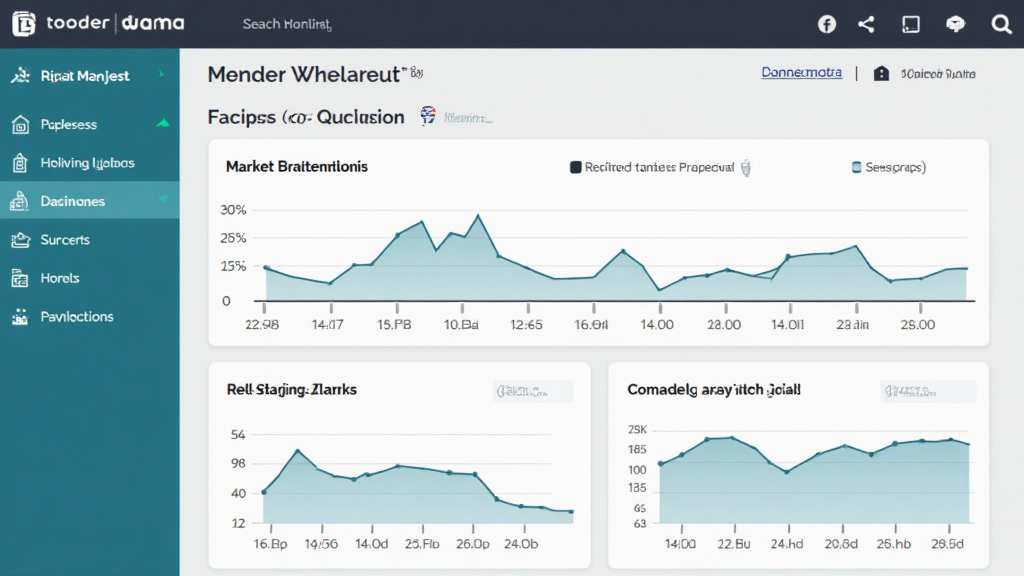Introduction
In 2023, the global real estate market was valued at over $280 trillion, representing an immense opportunity for investors. However, understanding the market’s psychological trends is crucial for making smart investment decisions. With the increasing complexity of markets, there’s a pressing need for effective real estate market sentiment tracking tools. As technology continues to evolve, these tools are becoming essential for navigating property investments, making them an indispensable resource in today’s property ecosystem.
What Are Real Estate Market Sentiment Tracking Tools?
Real estate market sentiment tracking tools are advanced analytics platforms designed to gauge and measure the feelings, attitudes, and opinions of participants in the real estate market. They use data from various sources, including social media, news articles, and market reports, to offer comprehensive insights into market trends.
Key Features of Sentiment Tracking Tools
- Data Aggregation: These tools pull data from multiple sources, synthesizing information to provide actionable insights.
- Real-Time Updates: Invest constantly, with real-time data reflecting the latest market sentiments.
- Sentiment Analysis: They use algorithms to assess the mood of the market, allowing investors to monitor shifts continuously.
- Visual Analytics: Dashboard interfaces allow easy understanding of complex data through graphical representations.
How Do They Work?
Sentiment tracking tools operate by utilizing machine learning and natural language processing to analyze textual data. They parse through billions of social media posts and news articles to gauge consumer confidence and market activities. By translating this sentiment into numeric values, investors can make sense of the emotional landscape surrounding real estate markets.

The Importance of Market Sentiment in Real Estate Investments
Understanding market sentiment can be as critical as analyzing property values. A positive sentiment might lead to increased buying activity, while negative feelings can signal impending downturns. Here’s why tracking sentiment is vital:
- Risk Management: By assessing market moods, investors can mitigate risks associated with volatile markets.
- Informed Decision-Making: With sentiment insights, investors can base decisions on broader psychological trends rather than solely on hard data.
- Predictive Insights: Sentiment indicators can provide predictions on future trends, influencing bidding strategies and investments.
Case Study: Vietnam’s Real Estate Market
As of 2023, Vietnam has witnessed remarkable growth in its real estate sector, with a user growth rate of 35% in property investments over the past year. The integration of sentiment tracking tools in this evolving market has transformed how investors approach property acquisition.
The Role of Sentiment Tools in Emerging Markets
- Local Insights: These tools provide localized sentiment data, reflecting the unique economic climates in Vietnamese cities like Ho Chi Minh City and Hanoi.
- Market Awareness: Investors using sentiment tools are more adept at navigating market complexities and taking timely action.
Comparative Analysis: Leading Sentiment Tracking Tools
Several tools dominate the market, each with distinct features tailored for real estate investors. Here’s a look at some of the top tools:
- Sentiment Flow: A robust tool known for its comprehensive social media analysis and sentiment scoring.
- Property Pulse: An intuitive platform providing visual analytics that are easy to interpret.
- Market Mindset: Focuses on investor sentiments specifically, allowing for targeted analysis.
Real Results from Sentiment Tracking
Recent data indicate that properties purchased when positive sentiments were high outperformed the average market growth rate by 20%. This trend exemplifies how sentiment tracking can lead to better investment outcomes.
Challenges and Limitations
While sentiment tracking tools have proven invaluable, they also come with challenges:
- Data Overload: Investors may face difficulty filtering through massive amounts of data.
- False Signals: Misinterpretations can occur, leading investors astray.
- Dependence on Technology: Over-reliance on these tools may hinder intuitive decision-making.
Looking Ahead: The Future of Sentiment Tracking in Real Estate
As technology continues to advance, the capabilities and effectiveness of sentiment tracking tools will expand. Innovations such as AI and blockchain integration will be at the forefront, offering even deeper insights.
The Role of Blockchain in Enhancing Security
The implementation of blockchain standards, or tiêu chuẩn an ninh blockchain, will ensure that data integrity remains uncompromised. These developments may lead to greater trust in the presented analytics.
Final Thoughts
In an era where investment decisions can make or break fortunes, utilizing real estate market sentiment tracking tools is no longer optional—it’s essential. As the market evolves, so must our approaches, arming ourselves with the analytical prowess these tools provide. The future of property investment lies in our ability to understand and react to market sentiment, ensuring smarter and more informed decisions.
For investors seeking to stay ahead in a competitive landscape, exploring these tools is crucial. The insights gained could mean the difference between profit and loss in the intricate world of real estate investment.
Remember, investing should always be coupled with robust research and the authority of expert advice. Always consult local regulators and conduct thorough diligence before making investment choices.
Written by Dr. Rebecca Chen, a recognized authority in real estate market analytics, with over 15 published papers and leading several high-profile market analysis projects.





